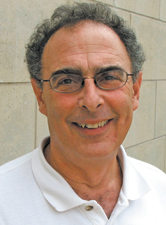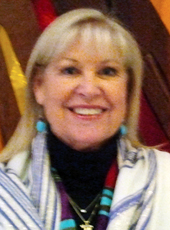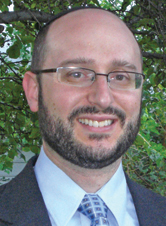By Barbara Bayer
Editor
 Religious pluralism is a phrase that’s being tossed around a lot these days. What exactly does it mean and why does the local rabbinical community, or the Jewish community at large, even care? These are some of the questions we asked several local rabbis recently, following a recent visit to Kansas City from Jewish Federations of North America President and CEO Jerry Silverman.
Religious pluralism is a phrase that’s being tossed around a lot these days. What exactly does it mean and why does the local rabbinical community, or the Jewish community at large, even care? These are some of the questions we asked several local rabbis recently, following a recent visit to Kansas City from Jewish Federations of North America President and CEO Jerry Silverman.
Silverman came to Kansas City in response to a letter sent to the Jewish Federation of Greater Kansas City urging the agency to advocate a variety of religious pluralism issues in Israel. The letter was signed by 14 local members of the Rabbinical Association of Greater Kansas City, most of whom represent the Conservative, Reform or Reconstructionist movements.
What is religious pluralism, specifically when it comes to the State of Israel? A simple explanation would be equality for all Jewish viewpoints. The rabbis’ letter explained it this way:
“We pursue our most deeply held Jewish values in the spirit of Rabbi Abraham Isaac Kook — the chief rabbi of Israel pre-dating the declaration of our Jewish democratic homeland. It was Rav Kook who, interpreting the words of our Sages in the Talmud, defined true peace not as a sharing of common viewpoints wherein all Jews think the same, but rather when we accommodate all views. Rav Kook articulated the need for the Shaleim of completeness — a pluralistic vision of Judaism and our Jewish homeland that will lead us to the shalom of peace.”
This issue has been brought to the attention of our Jewish community several times during the past year. Women of the Wall Chair Anat Hoffman, who is also executive director of the Israel Religious Action Center, was here last May at the invitation of The New Reform Temple. In early January Ronit Peskin, founder of Women For the Wall, spoke at the invitation of Congregation Beth Israel, Abraham and Voliner. (Women of the Wall supports the rights of women to pray at the Wall. Women for the Wall focuses on preserving Jewish tradition at the Wall.)
Why has this issue suddenly come to the front burner? Rabbi Scott White, president of the Rabbinical Association and rabbi of Conservative Congregation Ohev Sholom, said one reason is because recent developments — including the issues of who can pray at the Wall, who should be drafted to serve in the Israeli army and who can have a religious wedding ceremony in Israel — have focused the light on the issue.
Following the letter, and Silverman’s visit, the rabbis hope to keep the issue of religious pluralism in Israel on the front burner. One way of doing this is by meeting with several representatives from the Jewish Federation on a regular basis to discuss them.
“We’re getting ready to plan our first meeting, which we hope will happen relatively soon,” Rabbi White said. “It’s not an emergency situation but it’s a pretty urgent one.”
Why is this important to KC Jews?
“You cannot say to people we want the support of the entire Jewish community, and oh by the way you are not Jewish,” said Congregation Beth Torah’s Rabbi Mark Levin when asked why this issue is important.
“By the ultra-Orthodox definition of who is a Jew, the majority of young people in Kansas City cannot marry in the State of Israel. I think that’s a very important fact,” said the Reform rabbi, who supported the Rabbinical Association’s letter to the Jewish Federation.
Just one of the reasons this is true, he explained, is because many conversions performed in the United States are not accepted by the Orthodox rabbis in Israel.
“I cannot prove to you that it’s a majority but I will bet you it’s upwards of 50 percent, even as high as two-thirds,” Rabbi Levin said.
 Rabbi Beryl Padorr says it’s also about feeling welcome when we visit the Jewish state, comparing it to not wanting to visit a relative’s home if it’s uncomfortable and unwelcoming.
Rabbi Beryl Padorr says it’s also about feeling welcome when we visit the Jewish state, comparing it to not wanting to visit a relative’s home if it’s uncomfortable and unwelcoming.
“You don’t want to feel because you practice Judaism one way and somebody else practices Judaism another way that you aren’t welcome there,” said Rabbi Padorr, a Conservative rabbi who was ordained by the Ziegler School of Rabbinic Studies from American Jewish University in 2006. She is a full-time chaplain resident at Research Medical Center, works part-time at Children’s Mercy Hospital and teaches Melton classes.
As a rabbinical student, Rabbi Padorr lived in Israel for 10 months. In addition to feeling welcome, she said pluralism is about safety as well.
“What’s going to happen to me if I go to the wall and I put on my tallit and my tefillin and pray in a way that I would normally pray?” she asked.
Rabbi Levin believes the argument over The Wall is really a symbolic one of inclusion.
“It’s not the idolatry of The Wall as one person said to me, rather it is the symbol of God’s connection to the Jewish people and has been for 3,000 years,” he said.
As Rabbi Padorr simply states, in Genesis, God created everybody, and to her that is why pluralism is important.
“God didn’t just create you, me, a group; it doesn’t even say Jewish. God created people. God created humanity. I think it’s an obligation to respect each other as godly beings, made in God’s image, all of us,” she continued.
Israel is our homeland
Rabbi Daniel Rockoff, as the rabbi of Orthodox Congregation Beth Israel Abraham and Voliner, said as Kansas City Jews we are interested in the issue of pluralism because Israel is our homeland.
“In my community, many of our members and children and grandchildren value moving to Israel. Aliyah is a very important value for ourselves and if we’re not in Israel, than we value not just visiting but the relatives that we have there and the fact that it is our Jewish homeland. Not only do we value its existence and strength, but we also each interact with it on a regular basis.”
To some degree, Rabbi Rockoff said he faces the issues of marriage and conversion that his other colleagues face.
“I think there is a recognition, I think on the Israeli front also, that there does need to be some development, specifically with the Chief Rabbinate, to be more open and welcoming and reaching out to Jews as opposed to closing them off. I don’t know how that’s going to work. I’m not sure that the solutions that have been proposed to this point have been satisfactory and I don’t have the answer right now, nor do I think anything has been proposed that’s perfect.”
It is here that Rabbi Rockoff points out that while Israel is a democracy, it is still a relatively young nation and it is most definitely not the same democracy as the United States.
 “Israel’s mandate is to be the homeland for the Jews and has always done that for immigrants from every land, from every stream. It has not discriminated in that. At the same time, Israel is still a developing society, and developing in every which way,” Rabbi Rockoff said.
“Israel’s mandate is to be the homeland for the Jews and has always done that for immigrants from every land, from every stream. It has not discriminated in that. At the same time, Israel is still a developing society, and developing in every which way,” Rabbi Rockoff said.
“Certain things that were set up at the beginning of the state have changed in ways that Israel’s founders could not have anticipated. So for example the exemption of yeshiva students from the army was something that the founders of the state couldn’t see becoming a major societal issue because it wasn’t (an issue) when there were just a couple of hundred or a couple of thousand students.”
With all these issues, Rabbi Rockoff believes American Jews will have to understand that Israel works very differently than democracy works in the United States.
“Hopefully we can come to a productive resolution where Israel and the Diaspora communities can function with ever increasing harmony,” said Rabbi Rockoff, who did not sign the letter from the rabbis to the Jewish Federation but hopes to be a member of the joint committee established between the two to discuss these issues.
He believes American Jews definitely need to have faith in Israel, and support the Jewish state no matter what.
“It’s not our job to say we’re only going to support an Israel that does X or Y. We support Israel. They have to make their own decisions and we support them no matter what. Now we want to have influence and we want things that we believe strongly in and we’d like to share. There’s a lot that I think Israel can learn from American communities. However just as we need to have faith in them, Israel does need to look to us for guidance on certain issues. Certainly to the ones that relate to the Diaspora. Israel can’t start deciding how everything is going to work in America, too. There is going to need to be autonomy of Diaspora communities. And, by the way, there is an increasing recognition of that in some of the newer legislation and practices that are coming to the fore right now,” Rabbi Rockoff added.
Working together
Rabbi Rockoff points to the Kansas City Jewish community as a wonderful example of a community that has succeeded in working together with the various streams of Judaism.
“I hope that it can indeed be a shining example for other communities and for Israel as well,” he said.
Rabbi Levin said he believes, as do the “vast majority of the rabbis in this city,” that the Jewish Federation, its Israel and Overseas committee, and the Jewish Community Relations Bureau|American Jewish Committee need to work toward an inclusive Israel.
“Now many people, like Peter Beinert, are saying if we don’t do that, the next generation is lost. I don’t want to go there. I want to say the State of Israel was founded for worldwide Jewry. We absolutely must be included in the definition, not just of who is a Jew civilly, but be able to marry, be able to be buried. But the big thing right now is marriage. And to be able to live Jewish lives in the Jewish state,” Rabbi Levin said.
He wants to credit the Jewish Federation and its Executive Director and CEO Todd Stettner and JFNA’s Silverman for understanding the issue is an important one.
“But having said that, we are not yet anywhere near the goal and Israel needs to understand that if it expects the support of North American Jewry, then they have to include North American Jewry in Jewish expression in the Jewish state. So we will marry as Jews in Israel if we choose,” Rabbi Levin said.



